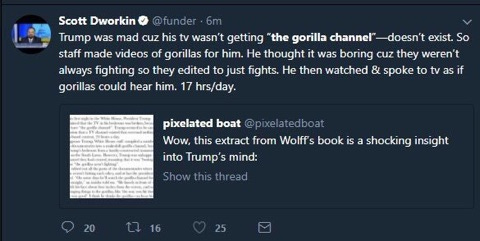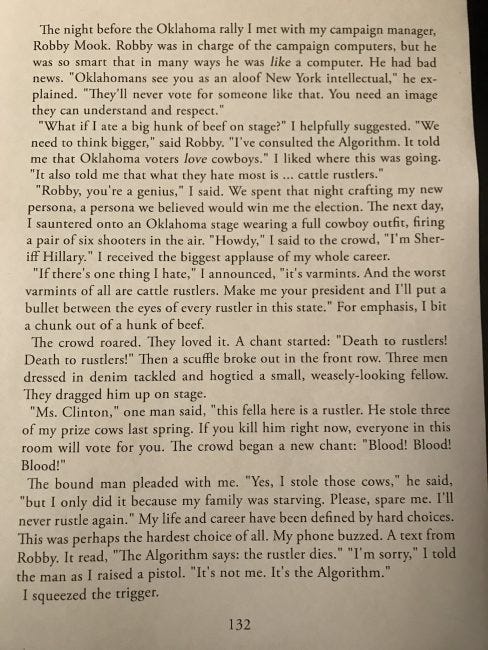What I Learned From Watching The Gorilla Channel

If you're a "citizen of the Internet", or one of the "Twitterarti" --- in other words, if your job is so short on actual work that you can spend your day on your phone or computer keeping up with the latest tempest-in-a-teapot --- then you've no doubt heard about the "Gorilla Channel". If you haven't, here's the story in a nutshell. The author Michael Wolff has written and released a book about President Trump, whom he calls "aberrant" although he sang a different tune when he was writing the book. Although I haven't read the book (and probably won't, I don't care for detailed psuedo-insider portraits of things that happened just months ago) it is being widely reported as being thoroughly critical of Trump, often to a degree that worries pundits on both sides of the aisle. Yesterday, a Twitter humorist who goes by the handle of @PixelatedBoat decided to publish a fake "excerpt" from the book. It's far from the first time he has done something like this, as you'll see. But this time was special --- because his parody page, which claimed that Trump spent 17 hours a day kneeling in front of a television and talking to gorillas, was taken as absolute gospel by a variety of heavy-duty left-wingers, including a few writers at the New York Times.

That's the "excerpt", which I think is absolutely hilarious. It appears to refer to a previous piece on Trump that was published in the New Yorker a while ago:

You have to admire the effort put forth by the New Yorker writer, whose distaste for Trump actually leads him to get sniffy about somebody not watching the "plot-oriented" parts of Bloodsport. The horror! How can you skip the parts of that movie where they aren't fighting? It would be like watching one of those Cinemax soft-care porn films and skipping to the parts where they get naked! That's disgusting! Jean-Claude didn't learn all that English dialogue phonetically so you could skip it! My GOD! Just to give you some context for the PixelatedBoat "excerpt", here's the same writer's parody of Hilary Clinton's shambolic "What Happened", which he posted on the day of that book's release:

What makes both of these parodies worth reading is their deft extrapolation of a public image, followed by deft evisceration of same. Mrs. Clinton generally impressed people as a cheerless, inhuman, inauthentic creature with a limitless will to power and zero scruples about exercising it; Mr. Trump came across as a braggart and an intellectual lightweight. In both of these "book excerpts", we progress from the merely extreme ("What if I ate a whole hunk of beef onstage?" and "Trump seemed to think there was a Gorilla channel") to the outrageous (Clinton's execution of the cattle rustler, Trump's mentally-handicapped seventeen-hour interaction with television gorillas). So why didn't the Hilary piece "go viral"? Simple: it concluded with something that could not have been concealed. Mrs. Clinton's friends in the media might be able to pull the covers over the infamous side of beef incident and they never let the wacky-head-moving thing get too much traction, but an on-stage execution during a rally would have been too big to hide. By contrast, the conclusion of the Trump "excerpt" concerns something that "happened" in secret. The public has been told again and again how "secretive" and "chaotic" the White House is at the moment. It seems reasonable to assume that we don't know everything that is happening in there. It's less reasonable to assume that President Trump kneels in front of a television 17 hours a day, but some people believed it anyway:


They weren't the only ones. NYT contributor Farhad Manjoo wasn't quite sure, and then he got angry about it (Twitter shows tweets in reverse order):

Scott Dworkin, who runs a Democratic-Party-affiliated fundraising organization and who claims to have "discovered" the "Trump-Russia connection", fell for it hook, line, and sinker, although after he was clowned from here to eternity he deleted his Tweet and said that he was just kidding. Which leads to the obvious question: Why were so many people easily tricked into thinking that the leader of the free world talks to gorillas on a television screen? The obvious answer to the obvious question is: Because they have been told about Trump's limitless stupidity so often that they have come to believe in it. That, in turn, leads to the only interesting question: What process has occurred to make generally reasonable and normal people accept something which is so obviously untrue? Regardless of what you might think about Donald J. Trump, he managed to get through two schools that are generally considered to be something besides a cakewalk: Fordham and Wharton. (Naturally, somebody has gone through the trouble of claiming that he didn't make much of an impression with his fellow classmates, because that sort of article is guaranteed to make money.) It's also worth noting that he attended these schools in an era where people were still expected to do something besides write essays about polyfat pansexuality wolfkin identity politics while scarfing down gournmet meals paid for with low-future-time-orientation student loans. Even if we assume that Trump somehow skated through those two schools, however, the evidence of his life suggests that he is anything but an idiot. Yes, he'd be wealthier now if he'd just put his inheritance in an index fund forty years ago --- but that oft-quoted factoid ignores the fact that he has spent hundreds of millions of dollars enjoying his life and flying around on private jets and grabbing beauty contestants and all that. He has repeatedly proven to be smarter than the bankruptcy laws, smarter than his fellow investors, and smarter than his competitors. Oh, and he also managed to win the Presidency with half the budget of his opponent and the not insignificant handicap of having every major news organization in the country except Fox openly shilling for said opponent to the point where most of them were predicting a 95 to 99 percent chance of a Hilary win the day before the vote. Now, you can suggest that he is probably not a genius in the Hawking or Newton sense, and I won't argue the point. But you cannot reasonably assert that a man who has managed to make a couple billion dollars through his own decision-making process is so stupid that he thinks he is talking to gorillas on the Gorilla Channel. I wouldn't believe that about the dumbest sandwich artist at your local Subway. I wouldn't believe that about a ten-year-old child from a disadvantaged background. It's not a credible allegation when it is leveled against Donald J. Trump. It doesn't matter how often the Post or the Times remotely diagnose him with dementia. You can't win Presidential debates when you have dementia. You can't speak off the cuff when you have dementia. At the age of seventy-one, he reads from a teleprompter better than Obama and is considerably more at ease without one than his much younger predecessor. I'm sure Trump is not as sharp as he was thirty years ago. That's true for me and it's true for pretty much everybody over forty. But there is a continental divide between "looks awkward holding a glass of water" and "talks to gorillas on the Gorilla Channel." After some (I hope) non-demented thought about this Gorilla Channel business, the best answer I can come up with is the following: The left wing of our country suffers from a dementia of its own, one in which individuals of average intelligence consider themselves to be brilliant because they mindlessly parrot the opinions of people whom they perceive to be brilliant. I'll prove it to you. Go take a look through the Twitter profiles of the people who believed Trump was stupid enough to watch the Gorilla Channel. Many of them are obviously well below Mensa-qualified, but there's nothing wrong with that. What's troublesome is how often they will rant about the stupidity of conservatives. The young lady in one of the above images who was completely taken in by Gorilla Channel has "Common sense has become so rare that it should be considered a superpower" as her Twitter motto, and a header image reading "1 out of 3 Trump Supporters Is As Stupid As The Other Two." I assure you that she is entirely representative of the general Gorilla-Channel-Is-Real group on Twitter. She thinks she is one of the smart ones. She thinks she "fucking loves" science. And she thinks that Trump must be stupid, because he doesn't agree with her ideas. And since she thinks he is stupid, it seems reasonable that he would do extremely stupid things. She is not alone. I've been on both sides of the political divide in this country, having voted for both Bill Clinton and George W. Bush, and I have noticed a worrying difference between my right-wing pals and my left-wing pals. My right-wingers say "So-and-so on the left wing is wrong/dishonest/lying/corrupt/evil." The left-wingers say "So-and-so on the right wing is stupid." The pervasive belief that your ideological opponents are not merely wrong but also stupid is absolutely fatal to the future of political discourse in this country. It carries all sorts of additional implications: that you don't need to examine your own positions because they are only opposed by stupid people, that your stupid opponents are less than human and therefore don't deserve equal treatment, that you are inevitably on "the right side of history" and therefore need neither compromise nor adjust your most extreme beliefs. A while ago I read something that affected me profoundly: Antonin Scalia's interview with New York Magazine in which he said, "Many more intelligent people than you or me have believed in the Devil." It hit me like a brick between the eyes, because for much of my life I've personally doubted the idea of anthropomorphic deities that fight on a daily basis for our souls and I've attributed that skepticism to the fact that I'm smarter than T.C. Mits, the celebrated man in the street. But Scalia is right. I think I'm pretty smart and I can probably return a one-in-a-million result for a lot of standardized testing but even that doesn't make me smarter than plenty of people who have believed in the Devil. Furthermore, they had the same amount of evidence for and against the Devil as I have now, which is to say none. Who am I to think that I have the authoritative answer on that, just because I can understand math or literature or art better than some "young Earther" sitting in a pew in a dirt-poor Tennessee church? By the same token, if a Christian who knows more physics than I do happens to believe in something that I don't, is he automatically right? Furthermore, who am I to think that I have the authoritative answer on anything else, whether it is illegal immigration or tax rates or 37 genders or all-wheel-drive? Nowadays, we desecrate the memories of this country's Founding Fathers because they supported slavery. Who's to say that history won't have the same opinion of Barack Obama because he ate meat? We're already taking a "critical look" at Martin Luther King, Jr. because he was disrespectful to Black women and because he told a gay kid he was mentally ill. How many of our current oh-so-enlightened opinions will be considered bigoted in fifty years, or in five hundred? Unfortunately, that kind of self-doubt isn't exactly commonplace among, say, Jezebel readers or contributors to the Daily Kos. They believe that they are intelligent because of their certainty, not in spite of it. They believe that their adherence to the progressive platform, as it is defined at precisely this moment, makes them smarter than the people with whom they disagree. They think they are scientists because they quote Neil DeGrasse Tyson, they think they are foreign-policy wizards because they agree with John Kerry or Mrs. Clinton, they think they are civil rights pioneers because they voted for Barack Obama. In their minds, adherence to the progressive doctrine is proof positive of intelligence. It's an odd form of self-referential Calvinism: How do you know progressives are smart? Well, all the smart people are! How do you know they're smart? Well, they're progressive! I should point out that right-wingers are afflicted by a similar misapprehension, namely: Their opponents are evil, lazy, anti-American, and so on. And some of the same circular logic is used on the conservative side: many people believe they are moral because they hold conservative views --- and that conservative views are held by moral people. I think that's why so many people were willing to believe that Mr. Obama was a Muslim. It didn't occur to them that his foreign policy with regards to Iran and Afghanistan could simply be wrong. It had to be evil. At some point, this country has to wake up and realize some truths. Holding liberal beliefs doesn't add a single point to your IQ. Holding conservative beliefs doesn't make your actions any more moral than they would be otherwise. If we can internalize that lesson, we can go back to a political process where we debate ideas instead of personalities and stop treating the news like a football game in which points are scored by a given side. We can get rid of so-called "whataboutism" and "truthiness". We can evaluate policies and choices on their actual merit rather than on how well they reinforce our individual beliefs. Don't hold your breath. It's not going to happen. Instead, we are all going to keep watching Twitter and Fox and MSNBC day and night, skipping over thoughtful discussions in favor of hard-hitting hot takes, telling our "enemies" that they are stupid or evil and telling the guys on "our side" that they did a really good job hitting that other... Holy shit. It's not Trump who is watching the Gorilla Channel. It's us.

